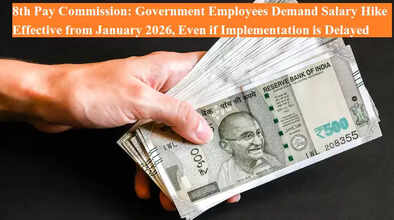8th Pay Commission: Government Employees Demand Salary Hike Effective from January 2026, Even if Implementation is Delayed

Central government employees and pensioners across the country are eagerly awaiting the rollout of the 8th Pay Commission. While the demand for early implementation is strong, reports suggest that the actual rollout might not happen before 2027. In response, employees’ associations have urged the government to ensure that the salary revision takes effect from January 1, 2026, irrespective of when the commission’s recommendations are formally implemented.
Employees’ Associations Raise Concern
Shiva Gopal Mishra, Staff Side Secretary of the National Council – Joint Consultative Machinery (NC-JCM), emphasized that the impact of any pay commission should not exceed ten years. Since the 7th Pay Commission came into effect on January 1, 2016, employees argue that the 8th Pay Commission must be considered effective from January 1, 2026.
Mishra further reminded that although the 7th Pay Commission recommendations were enforced in July 2016, employees were compensated with arrears for the period from January to June 2016. He said a similar approach should be followed this time, ensuring that government employees and pensioners do not face income losses due to delays in the rollout.
Formal Announcement Still Pending
Despite high anticipation, the 8th Pay Commission has not yet been formally constituted. The Union Cabinet approved the formation of the commission in January 2025, but the official notification regarding its Terms of Reference (ToR) has not been issued so far. Employee unions insist that the government must clear the ToR quickly so that discussions between the commission and staff representatives can begin without further delay.
Timeline for Implementation
Typically, any pay commission takes around 18 months to prepare its report. Following this, the government requires another 3 to 9 months to review and approve the recommendations. This means the entire process could extend well beyond 2026, raising concerns that the final rollout may slip to 2027. However, employees maintain that the effective date must remain January 1, 2026, to protect their financial interests.
Expected Salary Hike
The biggest question for government employees is the extent of the salary hike. Reports suggest that the fitment factor in the 8th Pay Commission could be set between 1.8 and 2.46. This factor is multiplied with the basic pay to calculate the new salary.
If the fitment factor reaches 2.46, employees could see a 14% to 34% increase in their salaries compared to the current pay scale. However, experts point out that whenever a new pay commission is implemented, the Dearness Allowance (DA) resets to zero, meaning employees will have to wait for DA increments to resume over time.
Why Employees Are Concerned
For millions of central government employees and pensioners, the outcome of the 8th Pay Commission is directly tied to their household income and expenses. Rising inflation, higher living costs, and increasing financial responsibilities have intensified the demand for a timely and fair revision.
Employee bodies argue that delaying the commission’s effective date would not only cause financial strain but also reduce morale among staff who have been waiting for this revision for nearly a decade. They are hopeful that the government will act swiftly to formalize the commission and provide clarity on the implementation timeline.
Key Takeaway
-
The 8th Pay Commission is expected to revise salaries and pensions, potentially offering a 14–34% hike.
-
Employees demand that revisions be effective from January 1, 2026, regardless of delays in the rollout.
-
The Union Cabinet has approved the commission, but the Terms of Reference are still pending.
-
Final implementation may take until 2027, but arrears could bridge the gap if the effective date is backdated.
With lakhs of government employees and pensioners depending on this decision, the pressure on the government is mounting. All eyes are now on the upcoming notifications, which will determine how soon and how effectively the long-awaited 8th Pay Commission becomes a reality.

